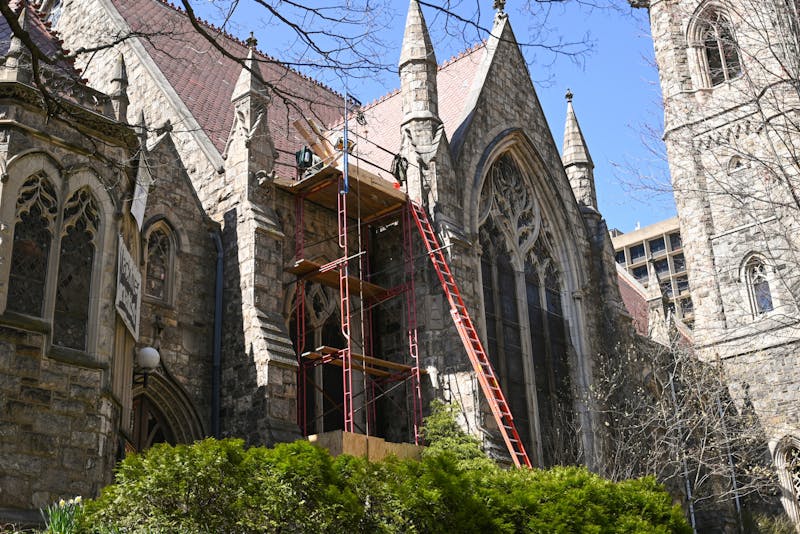
Penn students reported dissatisfaction with the University's crowd control and safety protocols at last weekend's Spring Fling concert — but several said that they enjoyed the event regardless.
Over 10,000 students attended Spring Fling last weekend, which featured performances by Metro Boomin and Daya. Students who attended reported feeling uncomfortable and fearing for their safety — particularly in the entrance line and during the concert itself — due to a lack of adequate crowd control management, and the Social Planning and Events Committee's leadership wrote to The Daily Pennsylvanian that they were "definitely concerned" about students' safety during the concert.
An announcement made during Daya's performance repeatedly asked students to back away from the stage to allow for more space. The announcement also said that a fire marshal was present on site and advising the discontinuation of the show.
The Philadelphia Fire Department did not respond to a request for comment.
Wharton senior and SPEC president Megan Li stated that SPEC worked closely with security, Penn Athletics, and other partners to ensure that the safety of both attendees and event staff was being prioritized.
“We had already increased the amount of the security personnel from last year’s concert, set up bike racks in order to encourage concertgoers to enter in an orderly fashion, and worked closely with MERT to set up a medical tent for those who might need it,” Li wrote to the DP. “Due to the sheer amount of people attending the concert and the unruly behavior of a select few attendees, all of our preprepared security measures became stretched too thin in the brief period where we saw the largest rush of attendee arrival.”
Division of Public Safety Director of Communications Stacy Ritchey wrote to the DP that DPS worked with event security to "relieve those spaces to ensure the physical safety of the attendees.”
“SPEC, University Life, Public Safety and other campus partners will continue to work to address any concerns raised from this event,” Ritchey added.
Wharton senior Hannah Zhao conveyed extreme dissatisfaction with student safety, describing the event as "very, very crowded."
“There really was no personal space and everyone was just packed in one huge crowd," Zhao said. "It seemed like there were supposed to be lines because, as we moved, there were metal gates — but they were useless.”
Zhao shared annoyance at students attempting to push past her despite all students paying the same price for the concert tickets. She recalled seeing overturned garbage cans, tables, and broken barricades, and had bruises on her legs after the concert.
“I’ve been in crowd situations before, and I never really feared for my safety,” said Zhao. “But when you start moving forward because you are being pushed and there isn’t space to move ahead, I think that’s [what] caused [me] to start being scared.”
Engineering junior Jasmine James also expressed concerns with the entrance line.
“It is great that there is merch and everything, but it’s always the line,” James said. “It’s too much. A little bit too much.”
College first year Allen Yan told the DP that, while he enjoyed the concert, the crowds and lines were a problem.
“I feel like the crowds and the lines were a little bit hectic all the time,” Yan said. “I got pushed around a lot.”
While Engineering first year Pedram Bayat said that Spring Fling was "really fun," he felt that the crowds were an issue.
“There were some tough times in the crowd with getting pushed around,” Bayat said. “Once everybody calmed down, the music was really good.”
College senior Mahdi Bouchekouk — the secretary and liaison to concerts for SPEC — recognized safety issues present during the show. He ascribed student behavior to substance intoxication leading to the concert almost being shut down.
"It is fully predictable that students would attend an event like Fling while intoxicated, but when students intake beyond their limit and are unable to control themselves or their behavior, it leads to the events witnessed where there were issues with crowd crush and students vomiting and blacking out before making it to the ticketing line," he said. "While we are a school sanctioned event, we cannot control the state that students arrive in or the behaviors they display."
According to Bouchekouk, only four students, who lacked any professional experience, were responsible for planning the show — adding that "our expectations of what would be needed to run a smooth show did not end up matching the scale that was needed." While he acknowledged that mistakes can happen, he emphasized the importance of students taking responsibility for their actions.
“The students that continuously pushed their way forward with no regard for the health, safety, or experience of the rest of the attendees are directly responsible for the issues faced in the crowd,” Bouchekouk said. “I hope they can realize soon that their actions led to a lot of students getting MERTed and cut the sets short for both artists.”
MERT declined a request for comment on this piece.
Li wrote that SPEC has “already started conversations with all of [their] security stakeholders such as Penn Police and Penn Athletics to see what can be done next year to ensure the concert goes safely and smoothly.”
“We are unsure of what exactly these measures will look like in the current moment, as there is much to debrief and analyze with our partners, but trust that these discussions are already being had,” she added.
Despite the safety concerns — for which Bouchekouk focused on crowd crunch on "one side of the barricade" — he said that SPEC prepared by handing out water bottles and providing seats in the back as a decompression zone and space for those with physical limitations to be able to enjoy the show.
SPEC received student feedback from the concert and comments which will be taken into account when deciding logistics for future Spring Flings, according to Li.
“The weekend was an insightful one for our team and for SPEC as an organization, and we look forward to incorporating all that we have learned into future Spring Flings,” Li wrote.
Bouchekouk shared his hope for an increased security presence at future concerts to help with both line and crowd control, and an increase in the number of workers to shorten wait times for future concerts.
Despite the safety concerns and the attendance record, multiple Wellness at Penn leaders told the DP that there was a decrease in the number of students who required medical attention in the emergency department compared to last year’s concert. Ashlee Halbritter — the executive director of Public Health and Wellbeing — attributed this decrease to the success of harm reduction initiatives.
“From a [Substance Use Prevention Education and Recovery program] perspective, all of the harm reduction initiatives that we had out throughout the weekend were extraordinarily successful,” Halbritter said.
The Daily Pennsylvanian is an independent, student-run newspaper. Please consider making a donation to support the coverage that shapes the University. Your generosity ensures a future of strong journalism at Penn.
Donate










